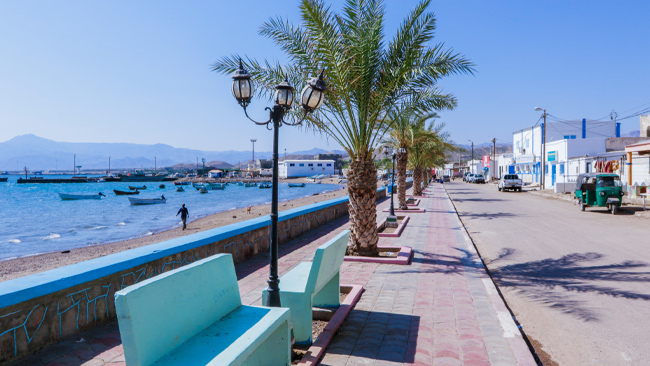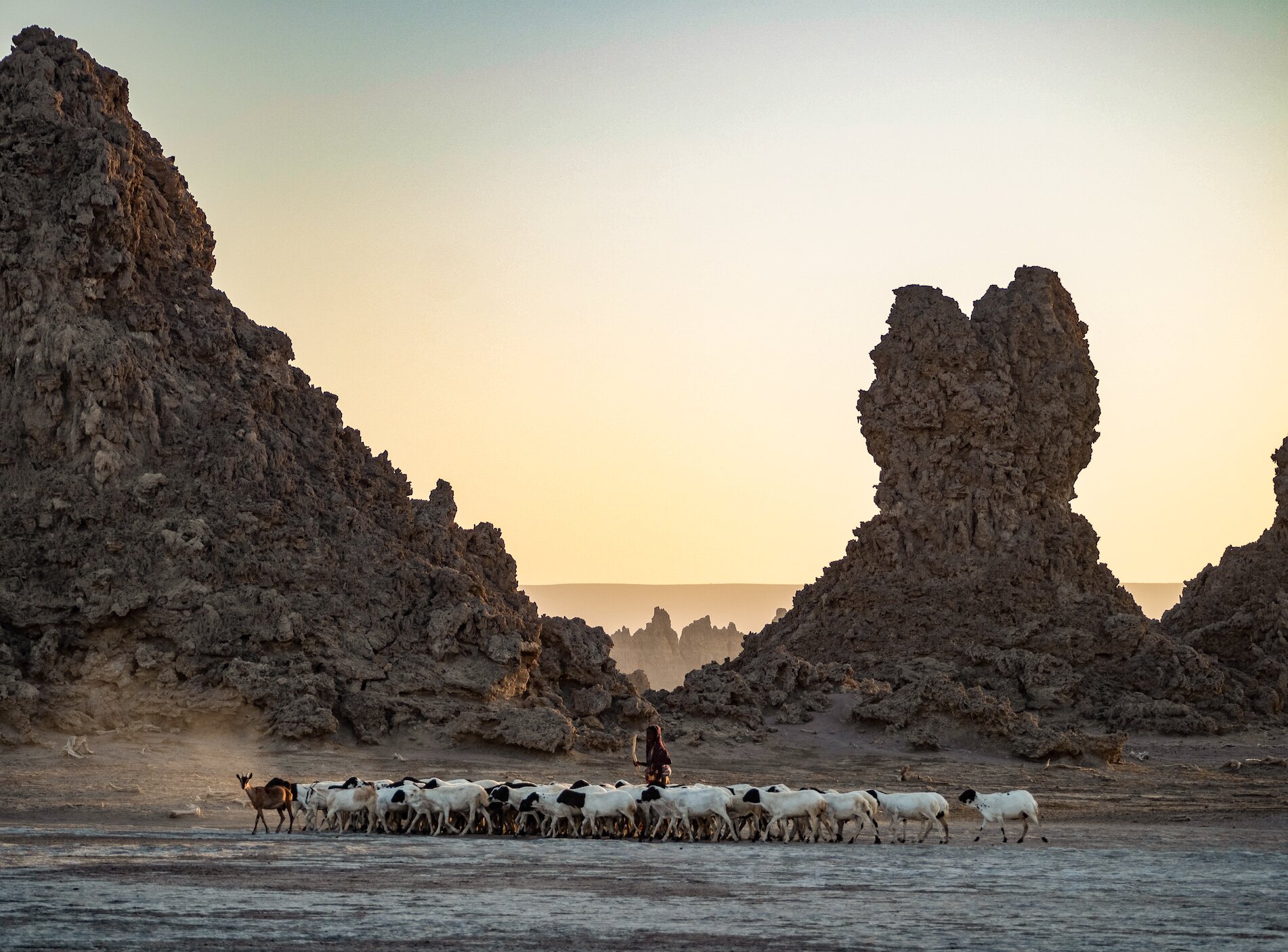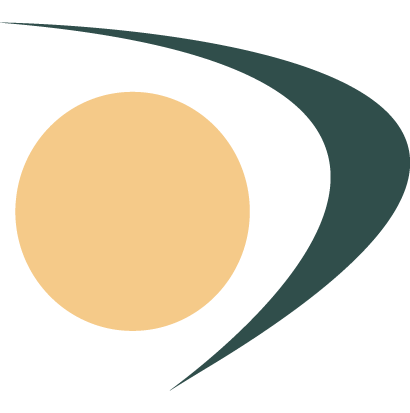The Language and Culture of Djibouti

Djibouti is a multilingual country known as “The Republic of Djibouti.” It is situated in the Horn of Africa and bordered by Ethiopia (southwest), Somalia (south), Eritrea (north), and in between the Red Sea and the Gulf of Eden (east). As of 2022, Djibouti’s population of about 1.1 million, was comprised of 527,817 males and 473,636 females. Over 60% of Djiboutians are below the age of 25. The country covers about 23,200 km2. The form of government practiced in Djibouti is a multiparty republic with only one legislative house, the National Assembly.
Djibouti comprises 60% Somali people (the Issa), 20% Afars, 6% Arabs, and 4% Yemenis, and the remaining 10% includes Ethiopians, Italians, and Europeans. The country’s flag consists of four colors; green, blue, red, and white. The blue signifies the sky and the sea, the green represents the evergreen earth, the white symbolizes peace, and the red signifies unity.
The Djiboutian coat of arms consists of two olive branches, a shield, a red star, a spear (representing Somali), and two daggers (representing Afar). The coat of arms illustrates a coexistence and relationship between the two most dominant ethnic groups.
Djibouti is a hot and arid land with a temperature range of about 23oC in winter and 40oC in summer. Its natural resources include gold, granite, limestone, and crude oil.

Major Languages of Djibouti
The official languages used in Djibouti are French and Arabic. However, Somali and Afar are the most widely used languages. Other languages include Ta’izzi-Adeni, Amharic, and Oromo, spoken by a few Arabs, and English and Italian, spoken by mostly foreigners.
French: Over 5% of the population in Djiboutian speak French. French is taught in primary and secondary schools and is used mainly in form
al settings such as government houses, business meetings, etc. Very few people in Djibouti are literate in the French language.
Arabic: is a Semitic language and part of the Afro-Asiatic language family. Arabic is the second official and recognized language of Djibouti, spoken by over 3% of the Djiboutian population.
Somali: the most commonly used language in Djibouti. It is a part of the Cushitic branch in the Afro-Asiatic language family. It is a means of communication in informal places like markets, homes, etc.
Afar: the third most spoken language in Djibouti also belongs to the Cushitic branch under the Afro-Asiatic language family. It is recognized as a national language and is used in radio broadcasts.
Religion in Djibouti

The primary religion practiced by Djiboutians is Islam, with 92% of the population and 8% belonging to Christianity and other religions. There are many mosques and very few churches for foreigners to attend. The Djiboutian constitution respects other faiths and supports equality irrespective of a person’s religion. Like in most Arab countries, proselytizing any belief in public is illegal.
Arts and Culture
Djibouti is famous for its French poetry and music festival, which takes place annually. The festival features famous and well-known music artists from other parts of the world. They are involved in other arts like singing and dancing, especially on special days. They also engage in popular sports like running, basketball, and volleyball.
Djiboutian is a multicultural country with a very unique and diverse culture. The Djibouti culture is distinct and mixed, resulting from the European, Ethiopian, Arabian, and Italian cultures. Visitors need to know specific codes of conduct that should be observed.
Fashion in Djibouti
Dressing patterns in Djibouti are primarily casual due to its scorching climate. Suits and shirts are only worn for special occasions or business purposes. Traditionally, Djibouti is known for its popular sarong garments, which they call Futa (very soft multi-colored material), mostly worn by women. In contrast, men wear towel-like cloth (Izar).
Food
Djibouti is known for its various dishes; rice, pasta, fish, dairy products, etc., are regular daily meals. The skudahkharis is a primary Djiboutian dish prepared chiefly for special occasions like Islamic holidays. It is made of rice and lamb stew. Other proteins such as beef, chicken, and fish can be included.
Family Life in Djibouti
The average size of a Djiboutian family is 5-6 children. In a polygamous family, the husband is expected to cater to his family while the wives are responsible for their children. Each household is assigned a duty in the family. Divorce is supported and very common in Djibouti.
Holidays and Celebrations for Djiboutians
Holidays are special days set aside for celebrations, seasons, or festivals. It is a time when people rest from work and school. The Republic of Djibouti celebrates ten national holidays. Many of these holidays are celebrated in days, and some have yet to set a specific date. This is because they are determined by the lunar cycle. Shown below are special holidays in Djibouti:
- New Year: this public holiday is celebrated on January 1st. It is the start of the Gregorian calendar and falls exactly one week after Christmas. The New Year’s celebration in Djibouti starts the previous day with a display of different cultures.
- Eid-al-Fitr: Eid-al-Fitr is a day strictly celebrated by Muslims. It marks the end of Ramadan, a month of fasting and prayer in Islam. The date is prone to change yearly as determined by the lunar cycle.
- Labor Day: Labor Day in Djibouti, also called International Workers Day, occurs every year on the 1st of May.
- Independence Day: Independence Day in Djibouti marks the Declaration of Independence from France in 1977. It is a national holiday celebrated by hoisting the national flag, parades, entertainment, and President and Prime minister speeches.
- Eid al-Adha: Eid al-Adha is a Muslim holiday and the most important feast on the Muslim calendar. It is a celebration of the obedience of the prophet Ibrahim to willingly sacrifice his son Ishmael according to Allah’s command.
- September Equinox: This occurs when the sun moves north to south, crossing the celestial equator. It is celebrated around September 23rd every year. In Djibouti, this is the start of spring, when the days begin to get cooler and longer, and the flowers start to bloom.
- December Solstice: The December Solstice marks the shortest day. It is also called the winter solstice and occurs around December 22.
- Christmas Day: This is a day celebrated by devoted Christians every of December 25th. Churches are decorated with Christmas lights and trees, and evening services are held to celebrate the birth of Jesus Christ.
Common Phrases Used in Djibouti
Though the official languages in Djibouti are French and Arabic, Somali is spoken the most. Learning some common Somali phrases is advised to ease communication in your day-to-day activities. The following are common phrases that will be helpful for someone unfamiliar with Djiboutian culture.
- Soo dhowow: Welcome
- Sideed tahay: How are you?
- Response: waan fiicanahay
- Subax waanaagsan: Good morning
- Fiid waanaagsan: Good evening
- Habeen waanaagsan: Good night
- Nabadeey: Goodbye
- Guul Ayaan kuu – Goodluck
- Magacaagu muxuu hay? What is your name?
- Magacaygu waa.: My name is…
- Maan fahmin: I don’t understand
- Ingriis miyaad ku hadashaa: Do you speak English?
- Af soomaaliga maad ku hadashaa? Do you speak Somali?
- Waan ka xumahay: Sorry
- Fad lan: Please
- Mahadsanid: Thank you
Translating for the Comorian Market
Somali, Afar, Arabic, and French are the significant languages in Djibouti. English and Italian are used mostly by foreigners. Although the government does not recognize Somali as an official language, it is the most spoken language in Djibouti and the best language for a person or organization wishing to start a business in Djibouti.
| Language | No. of speakers in Djibouti | Language family |
|---|---|---|
| Somali | 593,000 | Afro-Asiatic |
| French | 494,000 | Indo-European |
| Afar | 296,000 | Afro-Asiatic |
| Arabic | 30,000 | Afro-Asiatic |
The cost of translating these languages will vary depending on the type of translation and the number of words. This translation quick quote calculator is the best option to get the specific costs.
Business in Djibouti
For someone who wishes to start a business in a country like Djibouti, it is essential to acquire vital information and what it entails to complete the whole process. It is also important to at least get an understanding of how the Djiboutian currency works. The country’s currency is Djibouti, France (DJF). A dollar converted to Djibouti currency is equivalent to DJF 177. They have different denominations of paper bills; 1000, 2000, 5000, and 10,000. The use of credit cards and ATMs is minimal.
Business hours in Djibouti are between 8 AM-2 PM, Saturdays to Thursdays. Private sectors can choose to reopen from 4-7 PM. Registering your business or company in Djibouti is straightforward. It takes up to 21 days to get the whole process done. You must provide all required documents and make the necessary payments.
Business registration can be classified in the below formats depending on the nature of the business.
- Joint Stock Company (SA)
- Subsidiary
- Limited Liability Company (LLC)
- Single–Member Limited Liability Company (EURL)
Conclusion
To participate in a country’s culture and values, it is essential to understand how they communicate. Language brings about understanding, unity, and peace between two or more people. Language tells more about people’s identities. People are more likely to patronize services or products marketed in a language they can understand. Where you run your business will determine the best language to employ. Since Somali and French are the most used languages in Djibouti, making them available on your website is essential.
References
